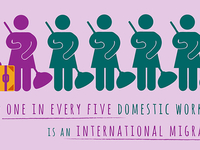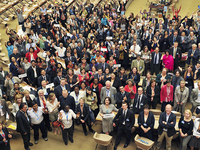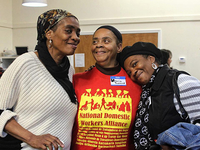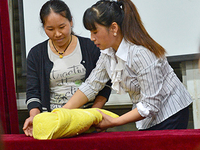GD 8.2 - August 2018
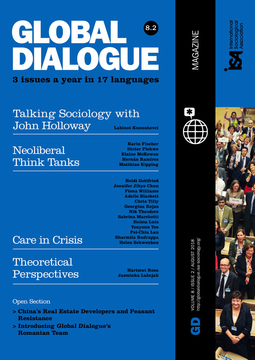
Global Dialogue is available in multiple languages!
Select the language to download the issue.
Editors:
Brigitte Aulenbacher, Klaus Dörre.
Assistant Editors:
Johanna Grubner, Christine Schickert.
Associate Editor:
Aparna Sundar.
Managing Editors:
Lola Busuttil, August Bagà.
Consultants:
Michael Burawoy.
Media Consultant:
Gustavo Taniguti.
Consulting Editors:
Margaret Abraham, Markus Schulz, Sari Hanafi , Vineeta Sinha, Benjamín Tejerina, Rosemary Barbaret, Izabela Barlinska, Dilek Cindoğlu, Filomin Gutierrez, John Holmwood, Guillermina Jasso, Kalpana Kannabiran, Marina Kurkchiyan, Simon Mapadimeng, Abdul-mumin Sa’ad, Ayse Saktanber, Celi Scalon, Sawako Shirahase, Grazyna Skapska, Evangelia Tastsoglou, Chin-Chun Yi, Elena Zdravomyslova.
REGIONAL EDITORS
Arab World: Sari Hanafi , Mounir Saidani.
Argentina: Juan Ignacio Piovani, Pilar Pi Puig, Martín Urtasun.
Bangladesh: Habibul Haque Khondker, Hasan Mahmud, Juwel Rana, US Rokeya Akhter, Toufi ca Sultana, Asif Bin Ali, Khairun Nahar, Kazi Fadia Esha, Helal Uddin, Muhaimin Chowdhury.
Brazil: Gustavo Taniguti, Andreza Galli, Lucas Amaral Oliveira, Benno Warken, Angelo Martins Junior, Dmitri Cerboncini Fernandes.
France/Spain: Lola Busuttil.
India: Rashmi Jain, Jyoti Sidana, Pragya Sharma, Nidhi Bansal, Pankaj Bhatnagar.
Indonesia: Kamanto Sunarto, Hari Nugroho, Lucia Ratih Kusumadewi, Fina Itriyati, Indera Ratna Irawati Pattinasarany, Benedictus Hari Juliawan, Mohamad Shohibuddin, Dominggus Elcid Li, Antonius Ario Seto Hardjana, Diana Teresa Pakasi, Nurul Aini, Geger Riyanto, Aditya Pradana Setiadi.
Iran: Reyhaneh Javadi, Niayesh Dolati, Sina Bastani, Sayyed Muhamad Mutallebi, Vahid Lenjanzade.
Japan: Satomi Yamamoto, Sara Maehara, Masataka Eguchi, Yuko Masui, Riho Tanaka, Marie Yamamoto, Kaori Hachiya, Ayana Kaneyuki, Erika Kuga, Kaya Ozawa, Tsukasa Shibagaki, Michiaki Yuasa.
Kazakhstan: Aigul Zabirova, Bayan Smagambet, Adil Rodionov, Almash Tlespayeva, Kuanysh Tel.
Poland: Jakub Barszczewski, Iwona Bojadżijewa, Katarzyna Dębska, Paulina Domagalska, Łukasz Dulniak, Krzysztof Gubański, Sara Herczyńska, Justyna Kościńska, Karolina Mikołajewska-Zając, Adam Müller, Zofi a Penza-Gabler, Aleksandra Senn, Anna Wandzel, Jacek Zych.
Romania: Cosima Rughiniș, Raisa-Gabriela Zamfi rescu, Maria-Loredana Arsene, Denisa Dan, Diana Alexandra Dumitrescu, Radu Dumitrescu, Iulian Gabor, Dan Gîtman, Alina Hoară, Alecsandra Irimie-Ana, Cristiana Lotrea, Anda-Olivia Marin, Bianca Mihăilă, Andreea Elena Moldoveanu, Oana-Elena Negrea, Mioara Paraschiv, Codruţ Pînzaru, Susana Maria Popa, Elena Tudor.
Russia: Elena Zdravomyslova, Anastasia Daur, Valentina Isaeva.
Taiwan: Jing-Mao Ho.
Turkey: Gül Çorbacıoğlu, Irmak Evren.
GD 8.2 - August 2018
Editorial
Market fundamentalism and neo-liberalism are affecting everyday life and experience in many parts of the world. Money, markets, and neoliberal thinking are at the core of contemporary politics in different supra-, inter-, trans-, and national contexts. This issue opens with two refl ections on these dominant tendencies of our time. In an interview, John Holloway, inspiring and keen-minded critic of capitalism, discusses the destructive forces of money, the dynamics of fi nance capitalism, and problematic developments in the European Union, but nevertheless emphasizes that another society is possible. The authors of our fi rst symposium on neoliberal think tanks remind us that neoliberalism refl ects the powerful tradition of the liberal idea of self-regulating markets. Neoliberal think tanks are infl uential protagonists of this idea although we might not be aware of that in our everyday life. Karin Fischer, a sociologist doing research on this phenomenon in international contexts, has put together a collection of articles, which show how such think tanks are working and infl uencing society.
In the last decade care and care work have become an issue that has received increasing attention from sociologists. For our second symposium, Heidi Gottfried and Jennifer Jihye Chun, well-known researchers in this fi eld, have organized a collection of articles which take us around the globe to refl ect on the deep ongoing and far-reaching changes in the organization of care and care work. Many facets of this topic – new care markets, the marketization of the body, changing family and gender arrangements, migration and global care chains – are considered to be fundamentally interwoven with the transformation of contemporary capitalism and relations of gender, race, and class. Additionally we present with the Research Network for Domestic Workers’ Rights an infl uential transnational initiative of social scientists and activists successfully struggling for better working conditions in the sector.
Over the last years, Hartmut Rosa, a German sociologist and social philosopher, has criticized modern capitalist societies for some of its core principles, that is, the constant need to accelerate, to grow, and to compete. Especially his thesis on resonance – or the lack of resonance – as one of the major problems of our time has been broadly discussed. In this issue he gives some insights into his concept of resonance.
Furthermore, an interview with Jasminka Lažnjak, who serves as the president of the Croatian Sociological Association, highlights developments in Eastern and Southeastern Europe and the challenges for sociology. Another article analyzes confl icts around urbanization in China. And last but not least, the Romanian team presents its work for Global Dialogue.
Brigitte Aulenbacher and Klaus Dörre, editors of Global Dialogue.
Global Dialogue can be found in multiple languages.
Submissions should be sent to globaldialogue@isa-sociology.org.









